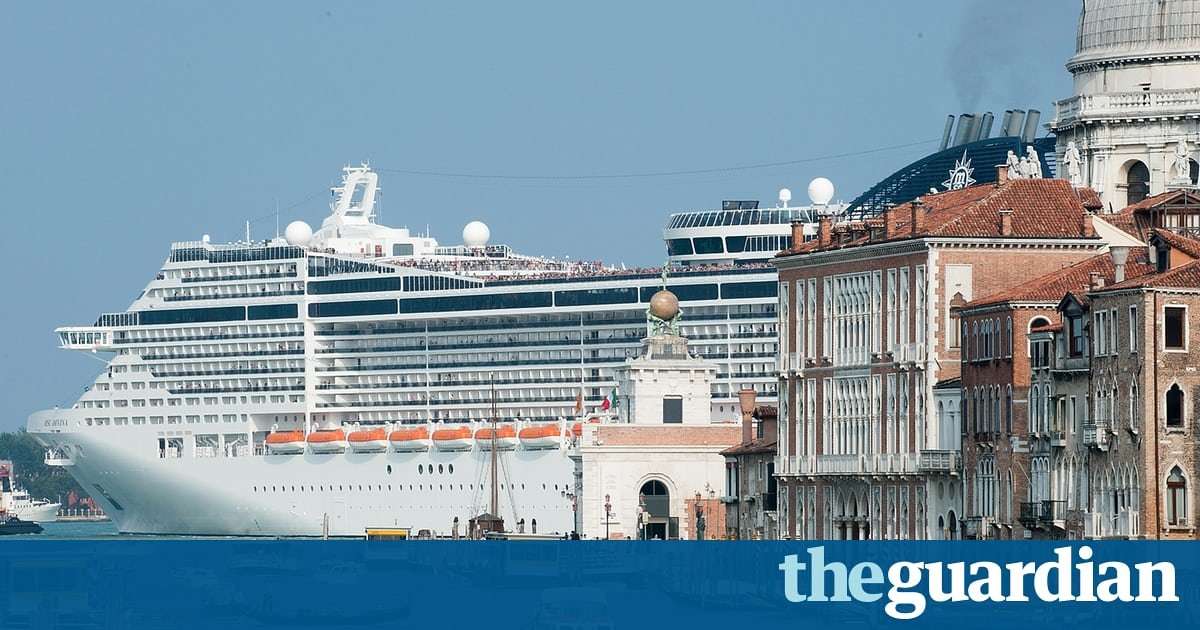German environment group says industry has not tried to cut pollution over the past year and reneged on a promise to install soot filters
The world’s cruise ships have done virtually nothing to reduce their pollution over the past year, with some still emitting as much particulate matter as 1m cars a day, a report says.
The annual survey of 63 ships, conducted by the German environment group Nabu, refused to recommend a single one for adequately reducing its environmental impact in 2017.
It accused the industry of having “contempt” for the health of its customers, saying companies had reneged on promises to clean up their fleets.
Popsicles of pollution: ice lollies highlight Taiwan's contaminated waterways Read more
“Last year the sector claimed 23 ships would be operating with soot filters,” said Nabu’s Dietmar Oeliger. “The truth is not a single filter is working at present.”
The report’s authors say a mid-size cruise ship’s diesel engine can use 150 tonnes of fuel each day, which would emit as much particulate as one million cars. In December, the Australian government passed a regulation forcing cruise ships in Sydney harbour to use low-sulphur fuel, after residents complained emissions were negatively affecting their health.
The New South Wales Environmental Protection Agency had earlier warned that docked cruise ships posed a health risk to those who lived near them.
“Many cruise ships emit high levels of fine particles and sulfur dioxide, both of which can be harmful to human health,” it said.
Nabu is calling on all cruise ships worldwide to ban their use of heavy fuel and to install particulate filters on all ships.
However, it said the German companies Hapag-Lloyd and TUI were the only ones to have taken any steps over the past year.
“Hapag-Lloyd and TUI share the top position due to the installation of nitrogen oxide catalysts, a small but important step towards cleaner ships,” the report said.
Industry leaders Costa, MSC and Royal Carribbean were all handed fail grades, along with the British-American company Cunard, which owns the Queen Mary 2.
The world’s largest cruise ship, Royal Carribbean’s Harmony of the Seas, which can carry 6,3000 passengers, came equal last.
“No company comes recommended in Nabu’s 2017 cruise ship rankings, which show just how little progress companies have made towards cutting pollution,” the group said in a statement.
“The cruise industry’s contempt for the health of its customers and port citizens is underlined by the fact that not one company responded to a simple Q&A supplied by Nabu.”
Huge cruise ships will worsen London air pollution, campaigners warn Read more
In March last year a London residents’ group said the pollution from cruise liners could prevent the city meeting its EU legal limits on noxious emissions.
The Brussels-based Transport and Environment group estimates pollution from international shipping caused “approximately 50,000 premature deaths per year in Europe”.
“Through chemical reactions in the air, SO2 and NOx is converted into fine particles, sulphate and nitrate aerosols,” it said. “Tiny airborne particles are linked to premature deaths. The particles get into the lungs and are small enough to pass through tissues and enter the blood.”

BranchySaturn28 on September 5th, 2017 at 15:27 UTC »
Good thing I get deathly sea sick and am a broke 21 year old, makes it a lot easier to boycott cruise liners and claim I'm doing it out of the goodness for the environment.
ThePandaRider on September 5th, 2017 at 12:20 UTC »
Until they are forced to install the filters and switch to a lighter fuel they aren't going to do it.
badgeringthewitness on September 5th, 2017 at 12:00 UTC »
Oddly, this article does not mention the international law problem at the heart of this issue: flag states.
These ostensibly European/American cruise ship corporations may be subsidiaries of an off-shore tax haven LLC/Trust, and the ships are likely "flagged" out of Panama or Liberia ship registries.
As such, they can ignore environmental NGOs with impunity.
However, these countries are still signatories of the International Maritime Organization's MARPOL 73/78 Convention and the 1997 MARPOL Protocol that regulates air pollution from ships. This treaty obligates all state parties to abide by specific emissions standards and equipment standards.
Since the major developed world ports (Europe, North America, Japan, Australia/NZ) are also signatories, they have the right to detain any vessel that does not meet these standards, and hold them until upgrades are made to bring these ships into compliance. This is relatively inexpensive for states and wildly expensive for cruise ship owners (so they quickly comply and retro-fit their ships).
TL;DR: Attempting to put pressure on the shipping industry is a waste of time. They need to convince their governments to enforce compliance with their international legal commitments, if the cruise ships in question are in fact in breach of these regulatory standards.